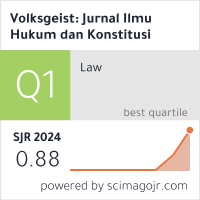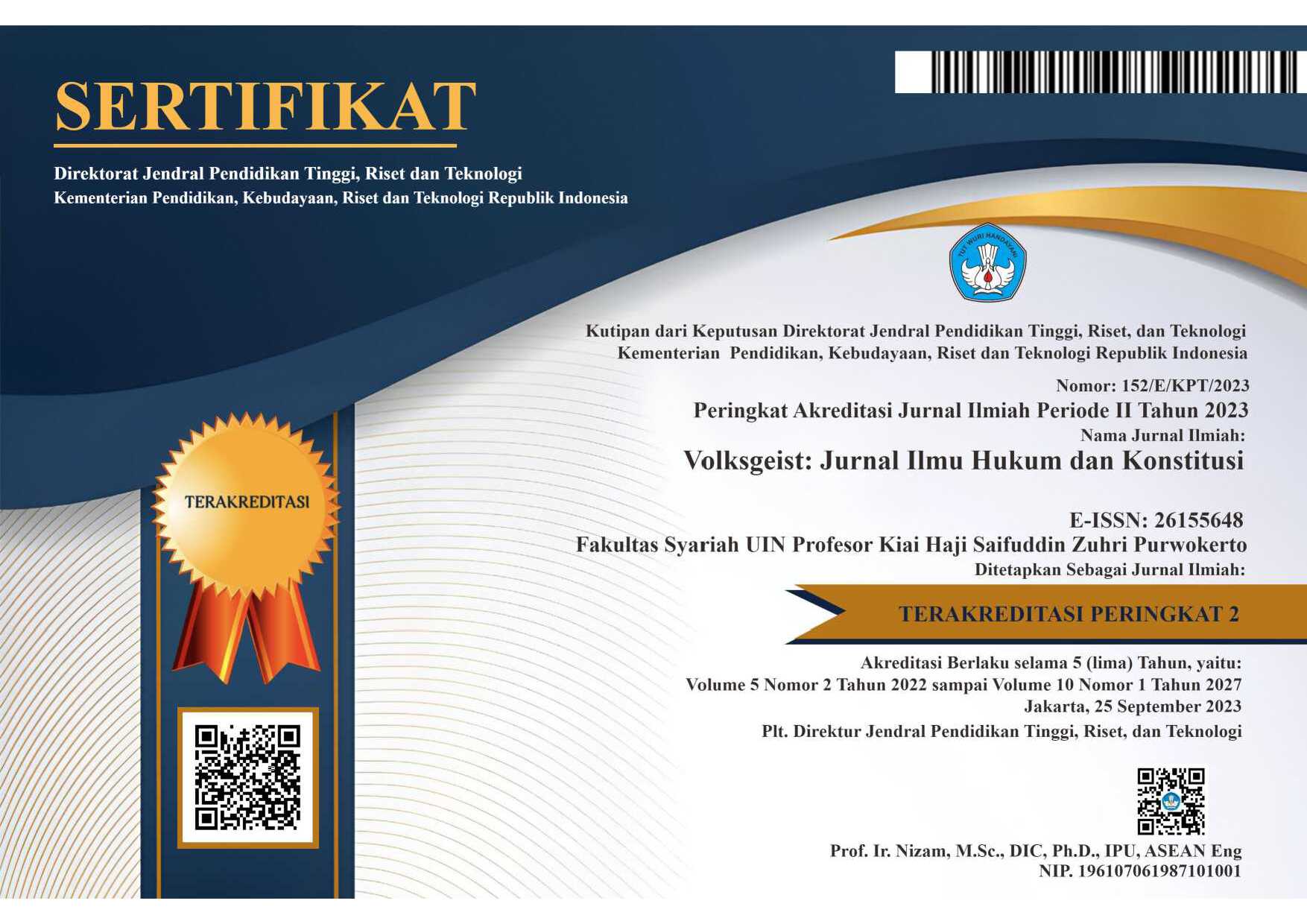Dewan Perwakilan Daerah Republik Indonesia dalam Perspektif Teori Bicameralisme
DOI:
https://doi.org/10.24090/volksgeist.v1i1.1742Keywords:
bicameral, unicameral, DPD, DPR, MPR, representative institutionAbstract
After the amended of Indonesian Constitution1945, there is controversy about the position and function of the DPD as representative institution. This article examines the theoretical concepts and applications of bicameralism and unicameralism in many countries in the world and contextualizes them in Indonesia. There are five concepts of ius constituendum that can be explored in this article; First the DPD has the authority of legislation, supervision, and valuation; Second, the DPD has the authority to discuss and participate in deciding all the draft bills proposed by the DPR; Third, the DPD has initiative right to submit a draft bill, but is limited to certain regional affairs; Fourth, the structure and position of the MPR were substituted as a joint house for the DPR and DPD. Fifth, the MPR does not need its own General Secretariat. The MPR also does not require permanent leadership, because it can be held alternately by the leaders of the DPR and DPD.Downloads
References
Azhari, A. F. 2008. "Materi Muatan UUD 1945 sebagai Undang-Undang Dasar Revolusi." Publikasi Ilmiah Universitas Muhammadiyah Surakarta. Surakarta: http://publikasiilmiah.ums.ac.id. 59-76.
Azhary, Muhammad Tahir. Negara Hukum: Suatu Studi Tentang Prinsip-prinsipnya Dilihat Dari Segi Hukum Islam, Implementasinya Pada Periode Negara Madinah dan Masa Kini . Jakarta: Prenada Media Group, 2015.
Budiardjo, Miriam, Dasar-Dasar Ilmu Politik. Jakarta: Gramedia Pustaka Utama, 2008.
Dahlan Thaib, dkk. Teori dan Hukum Konstitusi. Jakarta: Rajawali Pers, 2013
Fikih Siyasah: Ajaran, Sejarah, dan Pemikiran. 2014. J. Suyuthi Pulungan. Yogyakarta: Ombak Press, 2013.
Konstitusi, Mahkamah. n.d. Undang-Undang Dasar 1945 Negara Republik Indonesia . Accessed Juni 2, 2018. http://www.mahkamahkonstitusi.go.id/public/conten/profil/kedudukan/UUD_1945_Perubahan.
Magnis, Franz. Etika Politik : Prinsip Moral Dasar Kenegaraan Modern. Jakarta: Gramedia Pustaka Utama, 2016.
Manan, Bagir, Memahami Konstitusi: Makna dan Aktualisasi. Jakarta: Rajawali Pers, 2015.
Martosoewignjo, Sri Soemantri, Hukum Tata Negara Indonesia: Pemikiran dan Pandangan. Bandung: Rosdakarya, 2015.
MD, Moh. Mahfud, Politik Hukum di Indonesia. Jakarta: Rajawali Pers, 2017.
Pohan, Rahmad Asril. Toleransi Inklusif: Menapak Jejak Sejarah Kebebasan Beragama dalam Piagam Madinah. Yogyakarta: Kaukaba Dipantara, 2014.
Santosa, Arif,. Kamus Umum Bahasa Indonesia. Jakarta: Mahkota Kita, 2015
Sinamo, Nomensen, Hukum Tata Negara Indonesia. Jakarta: Permata Aksara, 2014.
Sirajuddin, and Winardi, Dasar-Dasar Hukum Tata Negara Indonesia. Malang: Setara Press, 2015.
Sukardja, Ahmad, Hukum Tata Negara dan Hukum Administrasi Negara Dalam Perspektif Fiqh Siyasah. Jakarta: Sinar Grafika, 2014
TAP MPR RI Nomor VII/MPR/2001 tentang Visi Indonesia Masa Depan.
TAP MPR RI Nomor III/MPR/2000 tentang Sumber Hukum dan Tata Aturan Peraturan Perundang-Undangan.
Warastra, Amrullah Karebet. "Konstitusi Sebagai Instrumen untuk Membatasi Kekuasaan Negara." Jurnal Konstitusi II (2): 47-62. 2009
Downloads
Published
How to Cite
Issue
Section
License
Copyright Notice
Authors who publish with this journal agree to the following terms: Authors retain copyright and grant the journal right of first publication with the work simultaneously licensed under a Creative Commons Attribution-ShareAlike 4.0 International License that allows others to share the work with an acknowledgment of the work's authorship and initial publication in this journal.











